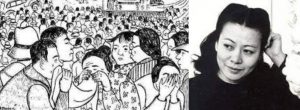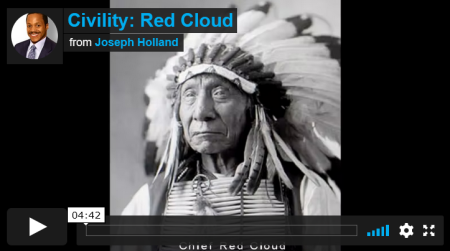Miné Okubo
WORD OF THE DAY
PERSONAL CONTEXT
HISTORICAL CONTEXT
SUCCESS PRINCIPLE
CIVICS LESSON
Click below to listen to audio:
COMMIT TO DAILY CREATIVITY
. . . my family name was reduced to No. 13660 . . . It’s a
horrible thing. I was a citizen. I didn’t do anything wrong.
Miné Okubo
When World War II started, 26-year-old Miné Okubo was traveling in Europe on an art fellowship. Okubo soon returned to the U.S. and as she worked making murals in San Francisco, the Japanese bombed Pearl Harbor. Within a few weeks Okubo was one of 110,000 people of Japanese descent — two-thirds of them were, like her, citizens, were forced to detention camps.
She was sent off to a converted race track, living in a manure-reeking 20-by-9-foot horse stall, sleeping on sacks stuffed with hay. Despite these horrific conditions, Okubo created 2,000 drawings, creatively documenting the daily lives of the internees. She published her visual record-keeping in her 1946 book “Citizen 13660.” Okubo committed to daily creativity, which captured the awful history of the interment in ways that enlightened her generation and beyond. Her words and the related principles will help you commit to daily creativity.
SIMMER YOUR ANGER
Line-ups here and line-ups there’ describes our daily life. We line up for mail, for checks, for meals, for showers, for washrooms, for laundry tubs, for toilets, for clinic service, for movies. We lined up for everything.
Before Okubo could creatively record her internment experiences, she had to discipline her emotions. She could have become so outraged over the injustice that imagination got consumed by her indignation. No matter much you’re suffering, strive to keep your anger under control. Leave room for your creative juices to flow.
STUDY YOUR CIRCUMSTANCES
In the camps, first at Tanforan and then at Topaz in Utah, I had the opportunity to study the human race from the cradle to the grave, and to see what happens to people when reduced to one status and one condition. Cameras and photographs were not permitted in the camps, so I recorded everything in sketches, drawings and paintings.
Being a student of your circumstances — especially your tough ones — is an important first step. Strive to be creative with the truth you discern from them.
SIMPLIFY YOUR EXPRESSIONS
To me, life and art are one and the same, for the key lies in one’s knowledge of people and life. In art one is trying to express it in the simplest imaginative way, as in the art of past civilizations, for beauty and truth are the only two things which live timeless and ageless.
Sometimes a picture, rather than words, is the best — and simplest — way to express your point. Okubo drew 2,000 pictures — at least one a day — of her interment. Figure out how to articulate your positions in simple yet vivid ways.
SET YOUR INTENTION
I am a realist with a creative mind . . .
Whether you’re an artist or writer, whatever your creative gift, commit to express it everyday. Daily discipline will help bring your creativity to life.
SHARE YOUR STORY
I realized that no one in the U.S. knew about this, so I started to tell the story, first with pictures.
Decades after her daily creativity, Okubo’s legacy lives on. Some of her drawings were included in a 1990s museum exhibit that toured throughout the U.S. and Tokyo. Your own seeds of creative discipline will also bear fruit that endures.
KEY POINTS
WORD OF THE DAY
Internment – the state of being confined as a prisoner, especially for political or military reasons.
PERSONAL CONTEXT
Born in California in 1912, Okubo’s parents had been born in Japan and emigrated to the U.S. eight years earlier. They encouraged their daughter’s interest in art, and Okubo worked hard at it, attending the University of California, Berkeley, earning a Master of Fine Arts degree in 1938 as well as the Bertha Taussig Traveling Art Fellowship. This distinction gave her the resources to travel, study and paint in Europe for two years. Upon her return to American Okubo worked for the Federal Art Project and showcased her European artwork in exhibitions at the San Francisco Museum of Modern Art.
HISTORICAL CONTEXT
The Japanese attack on Pearl Harbor on December 7, 1941 disrupted the trajectory of Okubo’s life; the lives of the entire Japanese and Japanese American communities in the U.S. were terribly impacted. Consequent to the Pearl Harbor attack President Franklin Roosevelt issued an executive order that prohibited people of Japanese descent from living on the West Coast. Okubo was forced from her home, separated from her family and was interned in California for six months before being transferred to Utah. Okubo persevered with her art at both locations, teaching art lessons to children and adults, helping to produce a literary magazine, and drawing about her difficult living conditions every day.
SUCCESS PRINCIPLE
See Success Principle Worksheet
CIVICS LESSON
See Civics Lesson Worksheet


